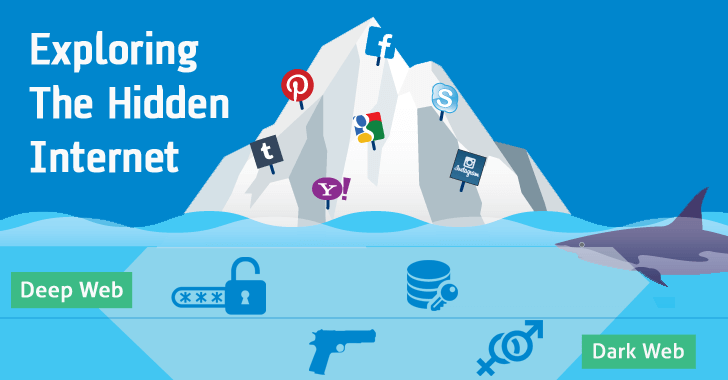【sex video izle】
Editor's note: We have sex video izlepublished an updated guide to the Dark Web here.
You may have heard about this mysterious place on the Internet called the 'Deep Web'. Interest in the deep web and dark web arose following a few high profile data leaks, a growing interest in online privacy, references in mainstream media, and the widely publicized FBI investigation into online marketplace Silk Road that exposed the extent of online drug trafficking.
But what is exactly the deep web? Well it's not actually a 'place' but rather anywhere other than the visible web that is crawled, indexed and accessed through links fetched by search engines like Google. The deep web is actually several times bigger than the indexed web, and it encompasses a lot more than the illegal or otherwise questionable activities that it is often associated with – though there's certainly a lot of that going on, too. Let's start by clearing up some of the confusion among the different terms that tend to be thrown around while discussing the Internet's underground.
Surface Web, Deep Web, Dark Web
In simple terms, the Surface Web is anything that a search engine can find by crawling links and identifying content online, while the Deep Web is anything that a search engine can't find. The Dark Web on the other hand merely represents a smaller portion of the deep web that has been intentionally hidden and is inaccessible through standard web browsers.
To exemplify this a bit further, the deep web can actually include things like academic databases, which can be accessed through a normal browser but are not accessible to search engines.

It also includes content within mainstream websites that is simply not set up to be accessed through a search engine. For example content posted on Facebook that is only available to the poster's friends, not the general public, or results for specific queries on a travel booking website – you simply can't get to the content by clicking through links like a search engine would.
Accessing the Dark Web
The Tor network is the most commonly known place where dark web content resides. This anonymous network consists of thousands of servers located all over the world run by volunteers and online privacy advocates. Its name is an acronym for 'The Onion Router' in reference to its namesake routing technique, which creates a path through randomly assigned Tor servers, or nodes, before reaching whatever website you are visiting. During this process data packets are wrapped in successive layers of packets that get "peeled off" at each node until reaching the destination.
Here is a more technical explanation, but in concise terms, the result is that no one node knows the complete path between your computer and a website, only the last place the packet was, and the next place it will be. This makes it almost impossible for anyone to trace the traffic back to you.
While finding content on the dark web can take time and plenty of patience, technically, accessing the Tor network isn't that complicated at all. You simply need to download and install the Tor browser available for Windows, macOS, and Linux. It is no different from installing any other piece of software and it's very simple to use as it's just a modified version of Firefox.
Protecting Yourself
If you're serious about the security of whatever it is you're doing on the dark web, it's worth running an entirely separate environment from your main computer and internet connection. Tails OS is a bootable operating system that's already preconfigured to maximize privacy and that you can run from a USB stick or a virtual machine. Tails has an installation wizard that guides you step-by-step through the process of setting up the software so that shouldn't pose much of a challenge either. Tails received a lot of press when it was disclosed that Edward Snowden was using it to avoid NSA snooping. Its sole purpose is preserving your privacy and anonymity online by relying on the Tor network and other tools to keep your activity secret.
Layering your location by starting at a random Wi-Fi hotspot and then connecting to a VPN before loading Tor will greatly increase your odds of anonymity.
We have written a more thorough, dedicated article to keeping yourself safe while surfing the seedy underbelly of the web. You can read that here.
Search
Categories
Latest Posts
Better Buy: Previous
2025-06-26 23:10Denzel Washington surprised a 86
2025-06-26 22:58'Judas and the Black Messiah' is pure dynamite: Movie review
2025-06-26 22:22Instead of kneeling, teams link arms during Thursday Night Football
2025-06-26 21:50The Anatomy of Liberal Melancholy
2025-06-26 21:32Popular Posts
Patched Laptops: Testing Meltdown & Spectre Patches on Ultraportable
2025-06-26 23:43Elon Musk changes Twitter bio to #bitcoin, chaos ensues
2025-06-26 23:16Featured Posts
How to Reboot and Reset Android Devices
2025-06-26 23:16Here's what Donald Trump had to say in response to the Las Vegas
2025-06-26 22:24Best robot vacuum deal: Save $300 on the roborock Qrevo Edge
2025-06-26 21:29Popular Articles
Fyre Festival and Trump’s Language
2025-06-26 23:32No, this NFL player didn't burn a U.S. flag in the locker room
2025-06-26 22:36Uber offers free rides after deadly shooting in Las Vegas
2025-06-26 22:23Jeff Bezos' Amazon legacy by the numbers
2025-06-26 22:22This new app is like Shazam for frogs
2025-06-26 21:29Newsletter
Subscribe to our newsletter for the latest updates.
Comments (347)
Information Information Network
Commissioning Misleading Core i9
2025-06-26 23:55Dream Information Network
Elon Musk is taking a break from Twitter again
2025-06-26 23:48Miracle Information Network
Tom Price criticized 'reckless government spending'
2025-06-26 23:27Happiness Information Network
Hedge fund Melvin Capital is down $4.5 billion after epic squeeze by Reddit traders, report says
2025-06-26 22:52Creation Information Network
Best rope light deal: Save 25% on Lepro N1 AI Smart RGB LED Strip Lights
2025-06-26 22:31